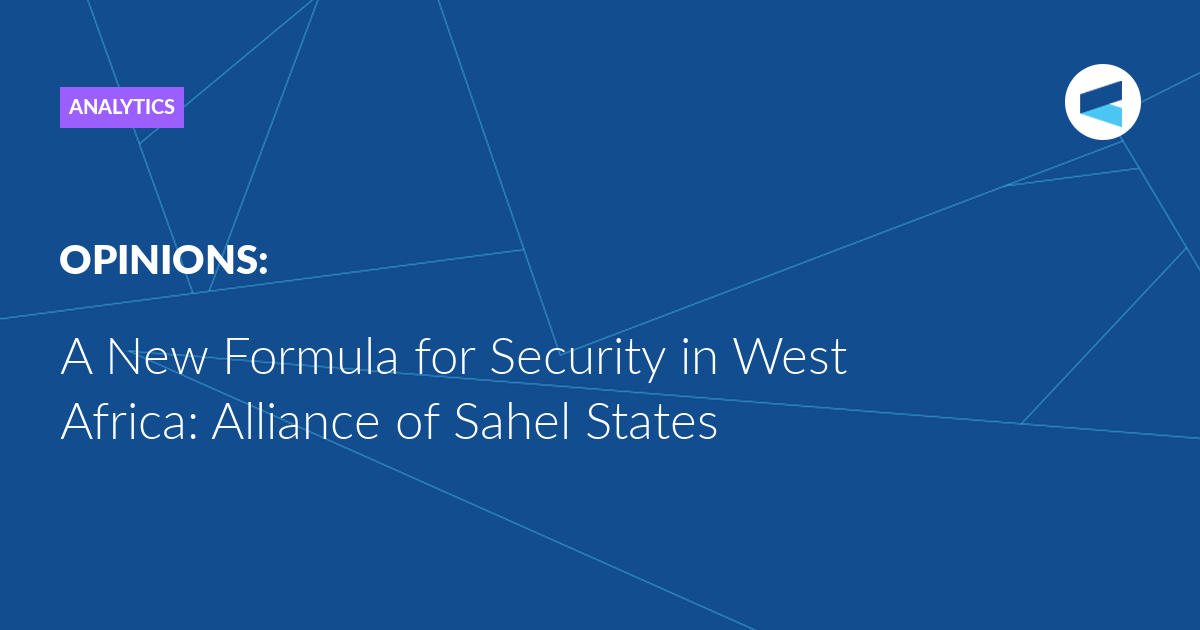Bound by a common destiny on issues of instability, security, the threat of terrorism, economic backwardness, etc., the Republics of Mali, Burkina Faso and Niger decided to unite primarily because they were faced with the threat of ECOWAS military intervention in Niger, and also because it was necessary to act against these evils.
On September 16, 2023, a new military bloc in West Africa appeared on the world map – the Alliance of Sahel States (AoSS). Burkina Faso, Mali and Niger established the group when they concluded an agreement on mutual military assistance, the Liptako-Gourma Charter. This new military bloc increases the number of military alliances already existing in the world, along with the Collective Security Treaty Organization (CSTO), the North Atlantic Treaty (NATO), the Tripartite Security Partnership between Australia, the United Kingdom and the United States (AUKUS), etc.
The creation of the AoSS changes not only the geopolitical map of the region, but also the military-strategic structure of the world as a whole.
Reasons for creating the AoSS
There were two main reasons for the creation of the AoSS:
-
The threat of terrorism, separatism and the economic backwardness of the Liptako-Gourma region.
-
The threat of military intervention by the countries of the Economic Community of West African States (ECOWAS).
These countries have witnessed an unprecedented increase in terrorism, which has persisted for decades. The situation in the region began to deteriorate sharply due to the overthrow of Muammar Gaddafi by NATO countries in 2011. This contributed to an unprecedented proliferation of weapons in the region. In addition, the return of the Tuaregs, who had occupied a worthy place in the Libyan Army, revived the old, painful question of the creation of their own nation-state, so-called Azawad, on the territory of Mali. The spread of terrorist structures and separatist movements was fuelled by the poverty of the region’s population, as well as the weak political, economic and social development of the states. Despite international intervention in the region, which was carried out until recently under the auspices of the UN and regional actors such as ECOWAS, the African Union (AU), the European Union (EU), and individual countries such as France and the United States, the situation has only gotten worse.
In addition, on July 26, 2023, a military coup took place in Niger, prompting a strong condemnation from the special session of the ECOWAS Assembly of Heads of State and Government convened on July 30, 2023. The session also issued an ultimatum demanding the restoration of constitutional order within a week, threatening ECOWAS military intervention to free the detained, democratically-elected President Mohamed Bazoum and restore the status quo in the country. Following the decision of the Assembly, in order to translate the ultimatum into action, the heads of the military staff committee of the ECOWAS member states met from August 2-4, 2023 in Abuja (Nigeria) to develop plans of action. On August 10, 2023, during an emergency meeting organized to address situation in the Niger Republic, the heads of state and government firmly reaffirmed their decision of July 30, 2024. In addition, they instructed the Military Staff Committee to activate the mechanisms of the ECOWAS Response Force for military intervention and the restoration of constitutional order in Niger. In essence, the ECOWAS military forces, after the end of the ultimatum, received carte blanche to send troops into Niger. In response to the threat of ECOWAS military intervention in Niger, which is already severely weakened by terrorist attacks, poverty, etc., Burkina Faso, Mali and Niger decided to join forces to stabilize the Liptako-Gourma region through the creation of the AoSS.
Creation of the Alliance of Sahel States
Bound by a common destiny on issues of instability, security, the threat of terrorism, economic backwardness, etc., the Republics of Mali, Burkina Faso and Niger decided to unite primarily because they were faced with the threat of ECOWAS military intervention in Niger, and also because it was necessary to act against these evils. It is obvious, that if a military intervention took place and was successful, then the same could be done in Mali, Burkina Faso, Guinea, and in any other countries where military coups took place, and in the future it would influence ECOWAS policy when building relations with other countries which were members of the organisation, although this had never been provided for in the ECOWAS regulations. On this basis and in order to avoid an irreparable situation in the region, on September 16, 2023, at the initiative of Burkina Faso, Mali and Niger, during a videoconference meeting between the heads of these states, a Charter was signed on the creation of the Alliance of Sahel States. This Charter was also called the “Liptako-Gourma Charter” because Liptako-Gourma is the historical name of the common regional space between these countries. It should be noted that already in 1970, a Memorandum was signed between Mali, Burkina Faso and Niger on the creation of the “Organisation for the Integrated Economic Development of the Liptako-Gourma Region” with the purpose of joint economic development, as well as ensuring security. Over time, this memorandum has repeatedly undergone a number of changes in its provisions, in 2001, 2017, etc. In this regard, we can say that cooperation between these countries in the Liptako-Gourma region is not a new phenomenon, but a continuation of the historical connection between them. Therefore, it is no coincidence that the Charter on the creation of the AoSS, in its preamble, mentions the “the integrated economic development of the Liptako-Gourma region.”
The AoSS is essentially a new military bloc/alliance in West Africa. Article 2 states that “the Charter has the purpose of creating collective security and providing mutual assistance among the members of the AoSS.” In addition, Article 6 states that “any attack on the sovereignty and territorial integrity of one or more contracted parties will be considered an aggression against the other parties.”
Thus, Article 6 of the AoSS Charter can be equated to Article 5 of the treaty establishing NATO and Article 4 of the agreement establishing the CSTO.
True, the AoSS has not yet formed the entire structure necessary to coordinate its actions (Article 3 provides for its creation in the near future). But, as you can see, the AoSS countries are already ready to provide military assistance to each other.
The Valdai Discussion Club was established in 2004. It is named after Lake Valdai, which is located close to Veliky Novgorod, where the Club’s first meeting took place.
Please visit the firm link to site






